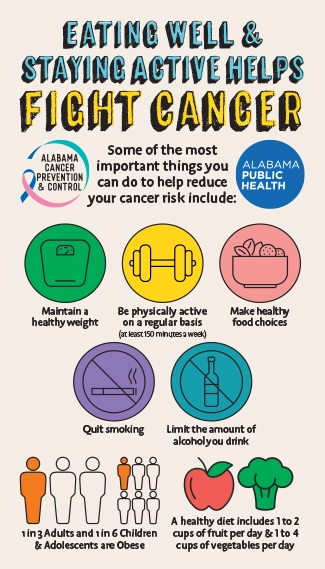- Cancer Division Home
- Cancer Control Coalition
- ASCR
- Breast & Cervical Cancer (ABCCEDP)
- Alabama WISEWOMAN Program
- Cancer State Plan
- Publications
- Print Material
- Breast Cancer
- Cervical Cancer & OPERATION WIPE OUT
- Colorectal Cancer
- Lung Cancer
- Prostate Cancer
- Skin Cancer
- Survivorship: Life During and After Cancer
- HPV: Cervical Cancer Prevention
- Nutrition and Physical Activity
- Contact Us
SEE ALSO:
Cardiovascular Health
Diabetes
Nutrition and Physical Activity
Oral Health
Tobacco Prevention/Quitline
NEED HELP?
Having trouble finding what you are looking for? Use our A to Z Index.
Cancer Division
ADPH’s Cancer Division helps to lead efforts in order to ease the burden of cancer. Cancer is the second leading cause of death in the United States; however, a cancer diagnosis is not a death sentence. Cancer can be treatable and even preventable. Prevention is the best way to fight cancer. Eating nutritious foods and being physically active can help prevent overweight or obesity, which may reduce a person’s risk of certain cancers related to excess body weight. This website provides information and resources on what cancer is, how to prevent cancer, and what to do after receiving a cancer diagnosis. The information and the materials are designed to educate and inform health professionals, policy makers, the media, and the public about cancer prevention and control.
Vision Statement: Citizens of Alabama will live long and healthy lives untouched by cancer.
Mission Statement: Implement programs in Alabama that will reduce incidence, morbidity and mortality related to cancer through prevention, early detection, and surveillance.
The Cancer Division consists of the following programs:
- Breast and Cervical Cancer Early Detection Program - a statewide program that provides breast and cervical cancer screening and diagnostic services to women who meet specific age, income, and insurance coverage guidelines.
- Cancer Control Coalition - a statewide network of physicians, organizations, medical groups, cancer patients, cancer survivors and interested individuals dedicated to reducing the impact and burden of cancer on Alabama.
- Cancer Registry - a statewide, population-based cancer registry which collects data on all cancer cases diagnosed or treated in Alabama.
- WISEWOMAN - a program that focuses on identifying and reducing cardiovascular disease risk factors including high blood pressure, obesity, diabetes, elevated cholesterol, physical inactivity, and tobacco use.
How does cancer occur?
All cells have a life cycle. The deoxyribonucleic acid (DNA) in a cell is what creates and directs the development of new cells. Sometimes a change in the cell’s DNA can alter the life cycle of the cell causing cells to grow rapidly and uncontrollably. The growing number of cells do not die and begin to form into tumors. If left unchecked, these tumors continue to grow, break off, and spread (metastasize) to other parts of the body.
Cancer doesn’t wait. Neither should you!
Regular cancer screenings can save your life by detecting cancer before it starts or by catching cancer early when it may be easier to treat. Many tests are available for free or covered by your insurance. Talk to your doctor about your family history and which option is right for you!
Also, if you are interested in receiving a free email reminder that lets you know when you become age eligible for appropriate cancer screenings, please use the American Cancer Society - Get Screened Reminder Tool.
Routine Cancer Screenings Are Still Important
If you had an appointment for a routine screening that was postponed or canceled, talk to your healthcare team about when to reschedule. Routine screenings are screenings for patients who are not experiencing any signs or symptoms of cancer. These can include screenings for breast cervical, colorectal, lung, oral, prostate, or skin cancers. Your provider can discuss balancing the risks and benefits of being screened now or postponing for a later date, taking into account your personal and family history, other risk factors, and the timing of your last screening test.
If You Experience Symptoms, Act Immediately
If you are experiencing symptoms that concern you, it’s important to call your health care professional for guidance immediately. If you have signs or symptoms that might be from cancer, for instance, a lump in the breast or blood in the stool, you should discuss this with your provider right away, as you will need exams or tests that evaluate those particular signs and symptoms.
Breast Cancer
Cervical Cancer
Colon Cancer
Oral Cancer
Lung Cancer
Prostate Cancer
Skin Cancer
Ways to Reduce Your Risk of Cancer
Whether you get screened now or have to delay until later, there are steps that you can take to reduce your risk and help prevent cancer.
How to Prevent Cancer or Find It Early
8 Steps to Cancer Prevention
We hope this information provides useful guidance as you consider when and how to safely resume cancer screening. Every community has its own unique situation and will need to rely on the judgment of the health care professionals and leaders in the community to make the best decisions possible.
This information is intended to help you understand the importance of returning to regular cancer screening as soon as it is safe to do so. At the same time, it’s important to remember that if you have signs or symptoms of cancer, or if you have additional risk factors that put you in a high-risk group, you should consult your doctor or a health provider right away for guidance.
Page last updated: January 28, 2026
SEE ALSO:
Cardiovascular Health
Diabetes
Nutrition and Physical Activity
Oral Health
Tobacco Prevention/Quitline
NEED HELP?
Having trouble finding what you are looking for? Use our A to Z Index.





